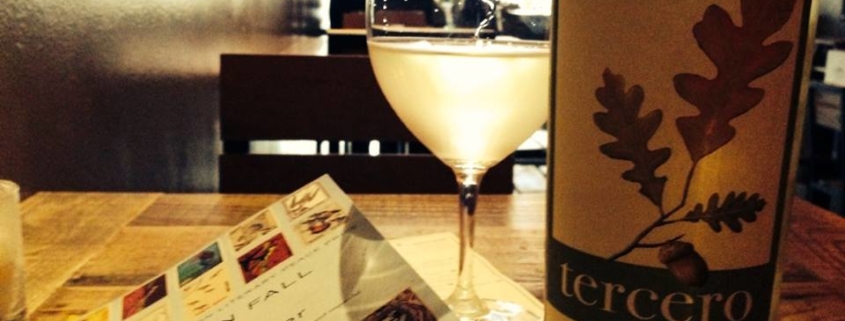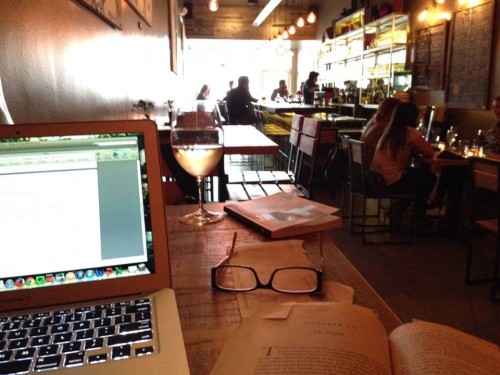A Wine Bar, the Blues, and the Reasons We Read
I am a nighttime reader. I turn pages till my eyes glaze, my fingers lose their grip, and my sweetheart moves my book to his nightstand. I find it there under a ray of sun while dressing for work the next morning, no recollection of his kindness or the last two pages. Beside my bed are three piles of books: books to read soon, books to read immediately, and books I have recently read but am not yet ready to put away. On his side of the bed are three piles as well: books read but not yet shelved, books he wants to read, and books I offer from one of my own piles with an earnest “you should read this” which he kindly takes and moves to his nightstand.
Lately I have been wondering, why is it we read? Not just why I read or you read and he reads, but “we” as in all human beings. I am not thinking of instruction manuals, I am thinking of books, essays, stories, poems. And I mean truly “we” as in all human beings, not just “we” as in writers. If we had no craft to hone, we would still read.
The question I am not asking is Why do we write? You and I—we have been writing since that first little blue diary with the lock on the side. Or was yours a classic composition notebook? Weren’t we both inspired by The Diary of Anne Frank? Or maybe you, like my youngest stepdaughter, began writing down stories inspired by fourth grade recess games. Even when we stopped journaling sometime in the years between Anne Frank and the New York Times’ Modern Love column, we eventually started again. Maybe it was The Artist’s Way morning pages. Maybe it was self-therapy over a divorce. I don’t have to ask the question because we know why we write. We write because the process of unloading our stories onto a page relieves us of their burden. We write because if we didn’t, we might die under their weight. We write because another story wants room to emerge. We write because through writing we live more completely.
But why do we read?
Recently some classmates and I were discussing a New York Times bestseller of narrow focus—The Wild Trees, a work of narrative nonfiction about Giant Redwoods and people who climb them. As you can imagine in a book about climbing trees, there were long passages about botany and climbing technique. In other words, not (to me) fascinating topics. But, many times throughout the narrative I found myself thoroughly engaged. My classmates and I shared this experience, which, in and of itself, was one of the most intriguing parts of the book. I found myself reading closer to understand why our small group of readers—comprised of both tree lovers and (gasp!) non-lovers—so enjoyed this book.
Since The Wild Trees, my classmates and I have moved on to other discussions, but I still find myself considering this question. What took The Wild Trees from being a story that the author was interested to write to a story I was interested to read?
The fact is, none of us would have picked up The Wild Trees if it were a botany textbook, and as writers, this is worth remembering. As readers of creative non-fiction, we desire more than white and black information. We want connection, and that comes in the grey areas of emotion. The author threw in tree-canopy-sex and a few scenes of oh-no-is-he-gonna-die, but there were other truly memorable moments in the narrative. Suspense and personal details enmeshed in the nitty-gritty botany made The Wild Trees a compelling book instead of a science lesson to make my head explode. Sure, we come to writing because there is a story that we want/need to tell, but we cannot forget our readers. In The Wild Trees, the author brought in universal human emotions of fear, love, anger, courage—from the man who did not survive his fall, the man who did, the sex in the branches, the anger, the swamp leeches, and rodents of unusual size. Those bits grabbed all of us in the story. Those are the parts that bridged the gap between a story that Preston wanted to write and a story we all wanted to read.

Tonight, faced with a lonely house and a deadline to meet, I’ve ventured out in search of an amiable writing locale. Between a café and a wine bar, I am now nursing a glass at the latter on a bet that the wine bar would be a little less raucous. I was right: there are five patrons including me, and a bartender. Acoustic blues is wafting sultry and gritty through the speakers, steel strings bending under a slide, aching voices bending under heartache. I can’t hear the lyrics, but I know from the vocalist’s cries that this music is deeply personal, and also poignantly universal. Blues is an emotion we all understand. It touches across generations, across state lines. Desire for what we once had, yearning for something not yet found, sadness for what was lost. It’s all in the music.
I am a nighttime reader, but a daylight writer. Even in a windowless room, I am alert and productive, somehow inherently aware of the sun shining in hot blasts outdoors. The sun is setting earlier now, however. Already the hour is not late, but a half moon hangs in the dark sky. The air, finally, breathes a promise of fall. Sunday night, and suddenly I am in the evening alone, but it is too early to retire with a book. So, like the five patrons here, I came out to join the world.
I’ve brought my laptop to the bar. I intend to write, which is always a deeply personal experience, but tonight, even as I type, I sit amid the company of others. The bluesy guitar in the speakers and the conversation at the bar remind me that we can sing and write and drink by ourselves. We all do it often enough. But aren’t we drawn out to the world from our lonely houses? Don’t we listen to the cries of others through music? And don’t we, after all, read because there is a world beyond our own personal stories? In the end we want to know we are not alone.






